Romania’s regulator has taken decisive action against a major crypto-betting platform.
The Polymarket platform has been added to the blacklist of the Oficiul Național pentru Jocuri de Noroc (ONJN) amid concerns over unlicensed operations and high volumes of political event trading.
As a gambling-industry expert, I view this as a turning point: prediction markets crossing into regulated gambling terrain. Operators and investors must take notice.
Read further to understand the case, the regulator’s reasoning, and what this means for crypto-based speculation platforms in Romania.
Key Points
- ONJN listed Polymarket among unlicensed gambling operators after discovering Romania-based transactions.
- The platform reportedly handled over 600 million USD during the presidential elections and more than 15 million USD during Bucharest local elections, per ONJN.
- Regulator classifies Polymarket’s activity as “pariuri în contraparte” (counter-party bets), which require licensing under Romanian law.
- Polymarket is already blocked in Belgium and other jurisdictions for failing to hold a gambling licence.
- The blacklist move triggers mandatory blocking by Romanian ISPs and signals enhanced enforcement of crypto-linked betting.
We can help you obtain your Gambling License
“Romania Blacklists Polymarket: Regulatory Clamp-Down on Crypto Prediction Betting Begins”
In the evolving intersection of cryptocurrency, prediction markets and gambling regulation, Romania just set a clear precedent. The blacklisting of Polymarket by ONJN marks a moment when regulators refused to accept the “prediction market” label as a shield for unlicensed betting.
What’s the Issue?
Polymarket promotes itself as a platform where users trade on real-world event outcomes using crypto. However, ONJN determined that the platform’s mechanics fulfil all the legal criteria of counter-party betting: users stake funds hoping for future gains, the outcome depends on an uncertain event, and they compete against other users—not the house directly. Thus, it effectively functions as gambling under Romanian law.
Data That Raised Alarms
ONJN’s analysis found that during Romania’s presidential elections the traded volume on Polymarket exceeded 600 million USD, and more than 15 million USD during Bucharest’s local elections—volume that occurred outside regulated, licensed channels. Those figures reflect not merely low-stakes trading, but significant speculative activity with gambling characteristics.
Why Now?
Crypto-based platforms have proliferated globally, often skirting traditional regulatory frameworks by claiming “decentralisation”, “prediction markets” or “financial instruments”. But Romanian authorities are signaling: if the structure resembles betting, the regulatory regime applies. The precedent from Belgium and other states reinforces this approach.
Implications for the Industry
From my professional perspective:
- Crypto platforms operating in Romania—or targeting Romanian users—must evaluate whether they truly qualify as trading instruments or gambling. Misclassification risk is real.
- Localisation matters: Operators must verify their access base and compliance with ONJN rules, including licensing or blocking obligations.
- Investors should factor regulatory risk into crypto-prediction market models. What seems innovative might collide with gambling laws.
- Traditional licensed operators may gain competitive advantage if unlicensed crypto platforms become fracture points for regulation and enforcement.
What Operators Should Do
Operators or entrants to the market should:
- Clarify the legal classification of their product in each jurisdiction: gambling, derivatives, prediction trade.
- Ensure licences if required—or exclude users from “regulated jurisdictions” such as Romania.
- Monitor regulatory signals: ONJN’s move is early but may spur similar enforcement in other EU states.
- Communicate transparently with users: disclaimers about jurisdictional access, user warnings and site geo-blocking are vital.
My Analytical View
In my analytical opinion, the Polymarket case exemplifies the regulatory convergence of crypto and gambling. Where platforms allow staking on uncertain outcomes, regulators will act—even if the platform brands itself differently. Romania’s ONJN isn’t just maintaining state monopoly over gambling; it’s asserting regulatory boundaries over emerging finance-gamble hybrids. This has strategic importance: it signals to global operators that for some jurisdictions, innovation does not equal exemption.
The blacklisting of Polymarket by Romania’s gambling regulator is a watershed moment. It emphasises that the structure of the activity—not its branding—determines regulatory treatment. As a gambling-industry professional, I view this as a clear call to platforms and investors: compliance is not optional simply because you operate in crypto or call it “prediction trading”. Romania’s move may well foreshadow a broader regulatory sweep of platforms masquerading as prediction markets—but operating as unlicensed gambling.
Get Expert Assistance with Your Romanian Gambling License
Navigating the Romanian gambling licensing process can be challenging, especially with varying requirements for resident and non-resident companies. Szilaghi Consulting specializes in helping businesses obtain their Class 2 gambling license efficiently and compliantly.
✅ Expert legal and financial guidance
✅ Assistance with company formation and tax registration
✅ Compliance support for ONJN licensing requirements
📞 Contact Szilaghi Consulting today to streamline your licensing process and start operating in the Romanian gambling market!


